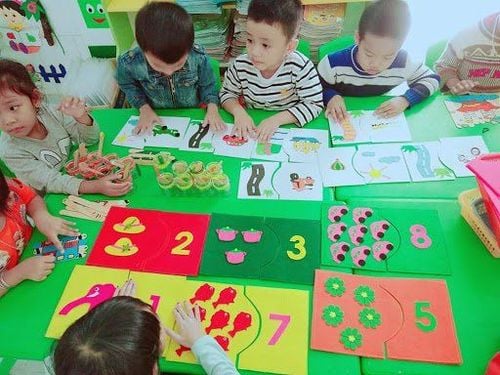This is an automatically translated article.
Creativity is the ability to create things that are unique and often have practical or artistic value. It is also a way to find new solutions to old and, more importantly, new problems. As your child becomes an adult in the workplace, he or she will always encounter problems that may not have been solved in the old ways, and thus require imagination or creative thinking.A child with creative thinking habits will be successful in his career and sought after by employers. In addition to the practical benefits of imagination, coming up with something new on your own is also a source of joy. This article will provide useful information to help parents raise an imaginative child effectively.
1. Young brains always develop with each age
Your baby is born with about 100 billion brain cells, and by the time he's a toddler, each of those brain cells is sending and sending impulses, creating connections between cells. Through repetition, these connections turn into networks that allow your child to think and learn.The early years are so important because everything your baby does with you - from playing to eating, walking, reading and singing - helps jumpstart his or her brain. By the time children enter kindergarten, their brains will have grown to have 1,000 trillion connections. The world for kids is now full of superheroes, fairies, princesses, princes, pirates, dinosaurs,... and imaginary friends. Are you wondering about your preschool-age baby to what extent imagination is developing, please refer to the following milestones:
Children 2 - 3 years old These babies begin to soar in the fantasy world. Children love to create something. When there is an opportunity to draw, color, collage or sing and dance, children will be excited to participate. A 3-year-old doesn't have the coordination or dexterity to create a beautiful work, but that doesn't matter. The most important thing is that the children tried and felt excited.
A 4-year-old Child has the following abilities:
Begins to empathize with others and to share Likes role plays with puppets and fancy costumes Likes lively games Tells a friend about a person you imagine or things can never happen. This is very common and completely normal as long as it does not affect the child's psychological development. Knows how to use art to express emotions. Can create more realistic works of art. At the age of 4, children can use a pencil more confidently and can draw a human figure with full body parts. This creative ability will grow more and more.
Also at this time, children want to know more about the real world, instead of just going to the imaginary world like before. Children often love the game of pretending to be someone, dressing up like an adult, then playing the role of father, mother, doctor or adventurer... These roles will help children explore the real world in detail. .
Children 5 - 6 years old Gradually get rid of their fear of the dark, cats and dogs, vague monsters... Can imitate and describe a character they like Can perform the dance they have learned Can combine sounds with other activities, such as singing and drawing Begins to be able to tell a complete story Children will enjoy playing with friends and participating in games with clear rules. Of course, these games still include "pretend" but more complex than before.
At the age of 5 to 6 years, children's ability to coordinate and use their hands is fully developed, making it easy for children to express thoughts and ideas, and draw complex shapes such as diamonds, triangle and star. During this time, children begin to use drawings to tell stories and express feelings.

Những năm đầu đời rất quan trọng vì mọi thứ trẻ làm với bạn đều giúp khởi động trí não của trẻ
2. How is the development of imagination beneficial to children?
Communication: Children who play imaginary games, hear about adventures and fairy tales tend to have significantly better communication skills. You may notice this in a few years, but to get the hang of it, build your child's skills now. Self-control : Just pretend to allow your child to be whoever he wants to be, explore positive and negative situations; practice what they have learned and let situations play out the way they want. Stories about baby goats fighting a vicious wolf or stories in which teddy bears even get sick and have to go to the hospital, giving children the feeling that they can be strong and in control even in the dark. scariest situations. Problem Solving: Dreaming of imaginary situations teaches your child how to think creatively, setting a good precedent for problem solving. A study done at Case Western Reserve University found that children who were imaginative at a young age tend to maintain this quality as they grow up and become better problem solvers. Experimenting later in life, early "imaginary people" are more experienced when faced with challenges and difficult situations, such as what to do if a child forgets a books that children need to bring to school that day.3. How to spark the imagination
Reading is a great way to enrich children's imagination. Choose books with large, colorful drawings instead of dense books filled with text and text. Show your child pictures of everything from tiny plants to old trees, from creatures as tiny as ladybugs to dinosaurs, from model cars to spaceships, from stars as small as the solar system,... making animal and vehicle sounds, applying special voices to different characters, and talking about what happened or might happen to people or animals in books.Share stories: Telling stories you make up is as good for your child as reading books together. Or you can let your child be the main character is also a great way to expand their sense of self. Soon, your child will be able to tell you his own stories and adventures.
Composing music : Even if your child is not ready for structured music lessons, you can still listen to simple songs or melodies with them that are easy to memorize and encourage participation by singing, dancing, or playing homemade musical instruments.
Limit time using electronic devices: The American Academy of Pediatrics recommends absolutely no media use for children under 2 years of age, but you can still allow your child to use smart devices. in moderation for about 30 minutes a day, but keep in mind that you must be the one to supervise the content children see. And as your child watches, watch the show with your child and observe how he reacts.
Encourage pretend play : Children learn a lot from dramatizing life events according to their imagination. When your child invents a scenario and plot and associates it with characters, he or she develops social and verbal skills. Children learn emotional problem-solving when they reenact scenarios involving feelings of sadness, happiness, fear, or safety.
Provide props: With children's rich imagination, everything can become magical like a carton can be a boat, a scarf becomes a cape of a superhero or a prince... Your job is to give your child everything he wants but always within a certain limit.

Đọc sách là một cách tuyệt vời để làm phong phú thêm trí tưởng tượng của trẻ
4. What can you do to let your child's imagination run wild?
Accept your child's imaginary friend: Experts believe that having an imaginary friend signals that a child is creative and has been able to manage his anxiety. However, if your teen starts to blame that friend for something your teen did, it's time to reconsider. Ask your child to take his mistakes seriously and correct the consequences of what he's done, and tell him it's unacceptable.Be optimistic and open-minded: When your child insists on wearing a superhero costume or a fancy princess outfit to class, let them do it. Adults are socialized to draw strict lines between public behavior and private behavior, but children don't think that way, they simply want to do what they like. Make every day fun for your children.
Don't be too rigid: Creating and implementing rules is an adult's job, but sometimes let your child be comfortable with his endless creativity. Get involved and have fun with your kids.
Besides, to help your child reach important developmental milestones. In addition to the nutritional diet, parents should supplement their children with supporting products containing lysine, essential micro-minerals and vitamins such as zinc, chromium, selenium, and B vitamins to help fully meet their nutritional needs. in children. At the same time, these essential vitamins also support digestion, enhance nutrient absorption, help improve anorexia, help children eat well, and develop comprehensively.
Please regularly visit Vinmec.com website and update useful information to take care of your baby and family.
Article reference source: babycenter.com, readbrightly.com













